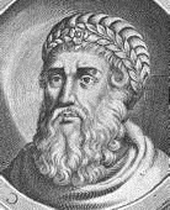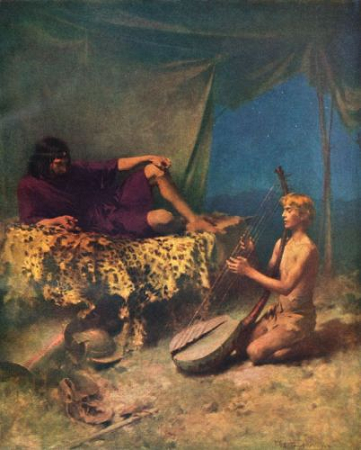
One Saint continues with selected excerpts of The Star of Bethlehem: The Star that Astonished the World, by DR Ernest L Martin. Today's focus is Astronomy and the Death of King Herod (Chapter Eight).
DR Martin first looks at the lunar eclipses of the time, and determines their importance when dating events, for they were usually witnessed and recorded in the historical record of the day.
"In the face of the historical evidence against it, the majority of theologians have up to now placed the birth of Jesus before the spring of 4 B.C.E. They have insisted on this early date because of a reference in Josephus that King Herod died not long after an eclipse of the Moon and before a springtime Passover of the Jews. This eclipse has become an important chronological benchmark in reckoning the year of Herod’s death.
"Eclipses are powerful astronomical indicators to show the precise times when events happened in history. Even those that happened 2000 years ago can be calculated to within a few minutes of their occurrence, and if one can pick the proper lunar eclipse that Josephus referred to, then further historical inquiry is considered unnecessary because “astronomy” has settled the chronological issue.
"Those theologians who adopted this astronomical principle for solving chronological questions are absolutely correct. There is no arguing with eclipses. They are solid and unchallenged witnesses to support the truth of early historical records — if the correct eclipse is considered. But when astronomers in the last century told theologians that an eclipse of the Moon occurred during the evening of March 13, 4 B.C.E. (and could be seen in Palestine), this eclipse is the one that theologians accepted as the one referred to by Josephus. They particularly preferred this eclipse because Josephus also said Herod died before a springtime Passover. Since March 13, 4 B.C.E. was just one month before the Passover, they felt justified in placing all historical events associated with Herod’s death and his funeral within that twenty-nine day period. The truth is, however, it is completely illogical to squeeze the events mentioned by Josephus into that short period of time. By selecting the wrong eclipse, modern scholars have been forced to tighten considerably the historical events into an abnormally compressed space of only twenty-nine days.
"Eclipse records are very important, but they must be interpreted correctly regarding the chronological period in which they occur. Over a ten-year period, several lunar eclipses are capable of being observed in most areas of the world. Two or three can even occur in one year. This relative frequency of lunar eclipses can be a problem in identifying the ones mentioned by the ancient historians if the early historians gave no details about the time of night, the day of the week, the calendar date on which they happened, or whether the eclipses were full or partial. With the eclipse of Josephus, none of these factors is evident. Josephus gave the single clue that a springtime Passover was celebrated not long after the eclipse. This would appear a reasonable hint that the eclipse happened sometime in the early or late winter..."
DR Martin elaborates with convincing argument and concludes with the likely timing of the death of King Herod.
___________
Martin, Ernest L. “The Star of Bethlehem: The Star that Astonished the World.” 26 DEC 2012. <http://www.askelm.com/star/star010.htm>
You can purchase the hardbound version of The Star of Bethlehem: The Star that Astonished the World, by DR Ernest L Martin at amazon.com.
You can read or listen to The Star of Bethlehem: The Star that Astonished the World at the ASK ELM website.
You can also listen to David Sielaff’s wonderful audio interview with George Ann Hughes at the Byte Show. These files bring us up to date, for David Sielaff continues the work of Ernest L Martin today. You will find the full interview at The Byte Show. Scroll way down to The Star of Bethlehem series, in fourteen parts.
Also available are all eleven parts of The Star of Bethlehem interviews Ernest L Martin did with Jeff Rense at ASK ELM.

 RSS Feed
RSS Feed